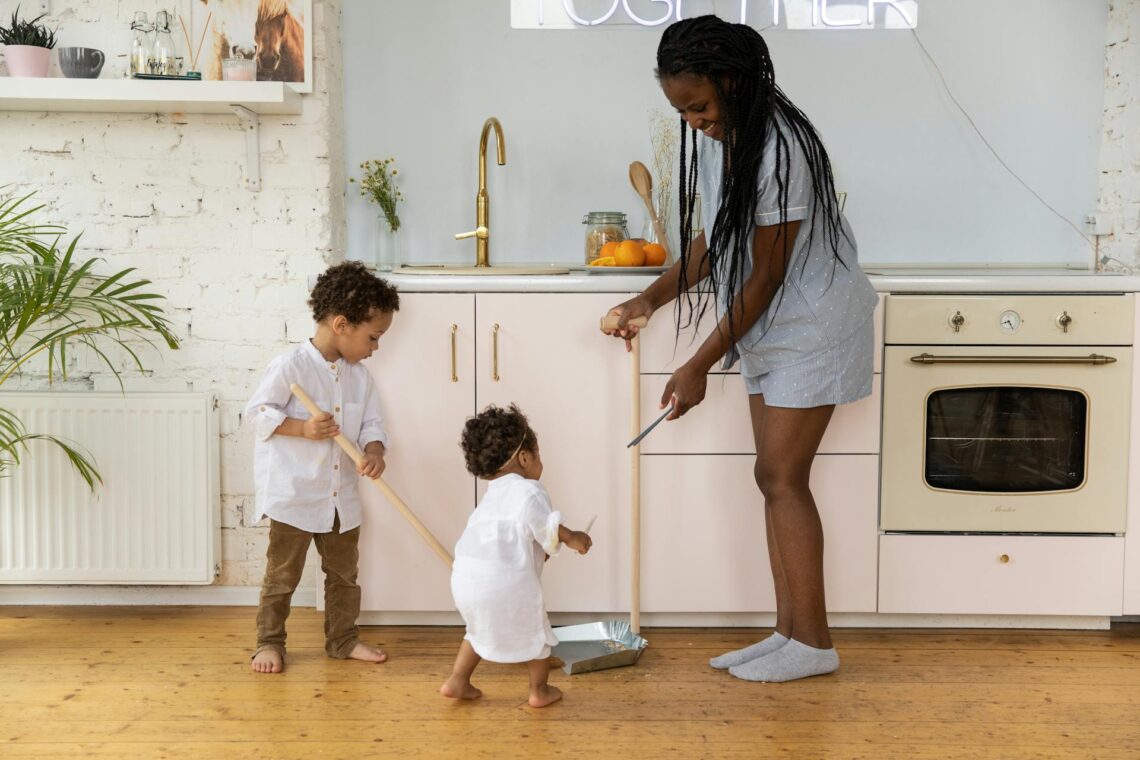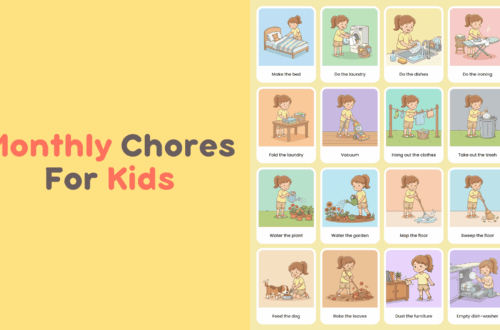It starts with a pile of blocks or stuffed animals scattered across the floor. You ask your child to clean up, and suddenly, they become the busiest little person on earth. Too tired, too distracted, or suddenly unable to remember where toys go. Sound familiar? These are the moments every parent faces when introducing chores for young children, small but powerful steps toward building independence and responsibility.
This is the everyday struggle parents face when introducing chores. The good news is that kids don’t need complicated tasks to start learning responsibility. By beginning with the easiest first chores for young children, you give them achievable wins, build independence, and set the stage for positive lifelong habits.
If you’re not sure where to begin, this article will walk you through why chores matter, the simplest ones to start with, and how to make them stick – without constant nagging. For a deeper dive, you can also explore our Ultimate Guide to Age-Appropriate Chores for Kids.
👉 Download our free printable chore chart PDF here to get started with a visual tool that makes chores fun for kids.
Why Chores for Young Children Matter
Chores aren’t just about keeping the house clean – they are powerful tools for teaching life skills.
- Responsibility: Kids learn that their actions directly affect the family environment.
- Independence: Even small chores create a sense of “I can do it myself.”
- Belonging: Helping at home reinforces their role as valued family members.
- Confidence: Completing tasks successfully builds self-esteem.
Research backs this up. A 75-year Harvard Grant Study found that children who did chores early in life were more likely to be independent and successful as adults. Similarly, the Journal of Developmental & Behavioral Pediatrics highlights how participation in chores builds problem-solving skills and emotional well-being.
Chores may look small – like matching socks or putting toys away – but they’re laying the foundation for discipline, teamwork, and resilience.
Easy First Chores for Toddlers and Preschoolers
Here’s a practical list of starter chores for ages 2–6. Keep them light, safe, and manageable:
1. Putting Away Toys
Encourage kids to return blocks, dolls, or cars to their bins. Use clear labels or picture cues for guidance.
2. Helping Feed Pets
Scooping dry food or refilling water bowls is simple but meaningful. It also nurtures empathy and responsibility.
3. Carrying Laundry to the Hamper
Whether tossing in their pajamas or dragging a basket, this teaches ownership of their belongings.
4. Wiping Small Spills
Hand them a small cloth for wiping the table after snack time. Quick, fun, and great for self-correction.
5. Dusting Low Surfaces
Give them a feather duster or microfiber cloth – kids love chasing “dust bunnies.”
6. Setting the Table (Plastic Items Only)
Napkins, spoons, and placemats are perfect starter responsibilities.
7. Watering Plants
A small watering can makes this a rewarding, hands-on chore.
8. Matching Socks
Turn laundry into a puzzle game – kids will be proud of their “matches.”
👉 Ready to make these chores stick? Grab your free printable chore chart PDF and turn daily tasks into a fun, trackable game.
Tips and Common Mistakes Parents Make
- Start small: Introduce 1–2 chores at a time.
- Make it fun: Use songs, timers, or challenges to keep them engaged.
- Don’t redo their work: Resist the urge to “fix” imperfections. Instead, praise their effort.
- Use positive reinforcement: Celebrate consistency, not perfection.
- Stay consistent: Chores should be part of the routine, not occasional requests.
One of the biggest mistakes parents make is expecting kids to “get it right” immediately. Chores are a learning curve – patience and encouragement go a long way.
Tracking Chores Made Simple (with the Kikaroo App)
Printable chore charts are a great introduction, but what happens when you want to track progress over time – or when you’re juggling multiple kids with different responsibilities?
The Kikaroo app makes it easy:
- Assign chores to one or more children
- Track progress visually with stars, points, or allowance systems
- Motivate kids with built-in rewards
- Replace nagging with structure – kids know exactly what’s expected
👉 Download Kikaroo today and turn daily chores into a stress-free, motivating family routine.
Internal Links for Deeper Reading
If you found this guide helpful, you’ll also enjoy:
- Parenting Tips to Make Chores Easier (Without Nagging or Arguments)
- The Complete Guide to Chore Charts & Tools (Printables, Digital Apps, and More)
Conclusion: Why Starting Small Works
When it comes to chores, starting with the basics is the smartest move. The easiest first chores for young children – like picking up toys or setting the table – aren’t just about a cleaner home. They’re about teaching responsibility, building independence, and helping kids feel capable from an early age.
By combining a simple chore list with supportive tools like a printable chart or the Kikaroo app, you’ll turn daily struggles into opportunities for growth. Over time, these small wins add up, shaping confident, responsible, and independent kids.
👉 Start today with our free chore chart PDF and see how quickly your child embraces their role as a helper in the family.

 Home
Home Features
Features Testimonials
Testimonials Downloads
Downloads FAQ
FAQ Blog
Blog








